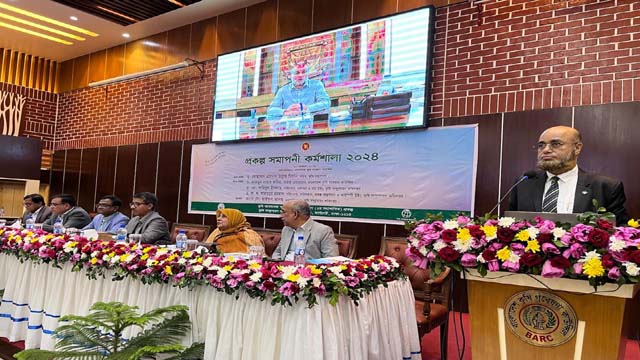
Agro-Meteorological Info Systems Final Workshop-2024
Published:
৩০ নভেম্বর ২০২৪, ১৯:০১

Bangladesh ranks among the most vulnerable countries to climate change and natural disasters. Delivering timely, reliable agro-meteorological information to farmers is essential for the country’s agricultural sector. Such information helps protect crops from adverse weather conditions and increase agricultural production while reducing costs by leveraging favorable weather. To achieve this, the Department of Agricultural Extension (DAE) under the Ministry of Agriculture, with financial support from the World Bank, has been implementing the Agro-Meteorological Information Systems Development Project since June 2016.
The project aims to provide farmers with high-quality, reliable weather and river condition information while enhancing DAE’s capacity to use improved data collection methods. The project is set to conclude in December 2024. A closing workshop was held on November 30, 2024, at the Bangladesh Agricultural Research Council auditorium to review the activities implemented over the past seven years, assess their impact, and discuss plans.
Dr. Mohammad Emdad Ullah Mian, Secretary of the Ministry of Agriculture, inaugurated the workshop as the chief guest. Special guests included Dr. Nazmun Nahar Karim, Executive Chairman of BARC; Dr. Md. Shahinul Islam, Director of Administration and Finance, DAE; and Dr. F. M. Mahabubur Rahman, Director of Planning and ICT, DAE. Mr. Md. Saiful Alam, Director General of DAE, presided over the session, while Project Director Dr. Md. Shah Kamal Khan presented the project’s activities.
Participants included DAE officers, representatives from the Ministry of Agriculture, the Planning Commission, and various research institutions such as BARI, BRRI, and BARC. Representatives from BADC, the Department of Livestock, the Department of Fisheries, the Bangladesh Meteorological Department, and other stakeholders also attended.
The project established the BAMIS portal, installed kiosks in 487 upazilas, and set up community radios, digital display boards, and agro-meteorological analog boards across the country. It provided 6,664 tablets to field officers for disseminating weather and climate data to farmers. Agro-meteorology departments were introduced at two universities, and 160 weather stations were installed for better data access. Emergency advisories and seasonal forecasts were also made available to farmers.
In his speech, Dr. Mohammad Emdad Ullah Mian highlighted the need for a second project phase to address challenges and ensure sustainability. Participants emphasized the importance of continuing essential activities through DAE beyond the project’s completion, underscoring the critical role of such initiatives in mitigating climate risks and supporting agricultural resilience.



Comment: